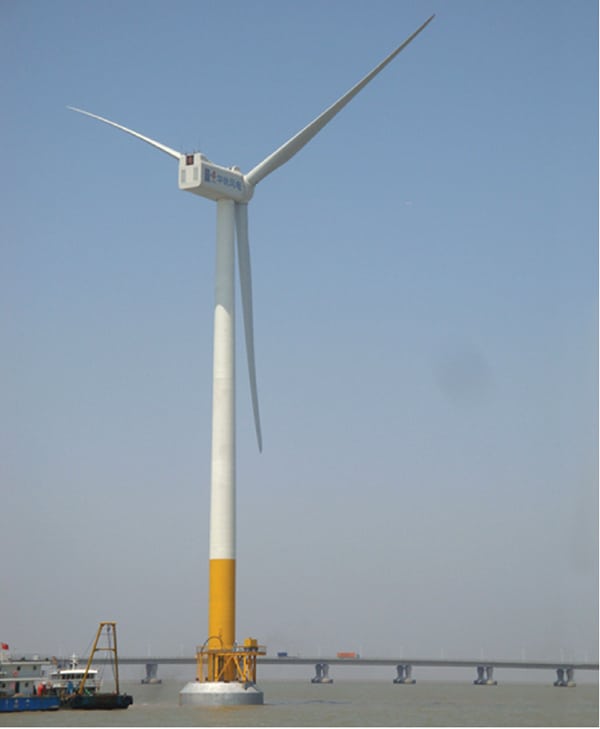AMSC Former Employee Convicted in Sinovel Intellectual Property Case
An intellectual property battle between Massachusetts-based American Superconductor Corp. (AMSC) and China’s giant wind turbine maker Sinovel in late September culminated with an Austrian court conviction of a former AMSC employee, who was arrested in Austria and who pled guilty to corporate espionage charges. The court charged Dejan Karabasevic, a 38-year-old Serbian engineer, with stealing AMSC’s software, modifying it, and secretly selling it to Sinovel.
Technology firm AMSC has been supplying core components, software that controls the productivity and quality of wind power in turbines, and licensing of turbine designs to Sinovel since 2006 (Figure 2). Until this May, nearly 80% of the firm’s earnings came from Asia’s largest wind turbine maker. The relationship has soured and an intellectual property battle ensued this April, when Sinovel rejected a large shipment of control components and subsequently rapidly scaled back business with the firm.
 |
| 2. When the wind was fair. Massachusetts firm American Superconductor Corp. (AMSC) has accused China’s biggest wind turbine maker, Sinovel, of intellectual property infringement. A former AMSC employee has been convicted of providing source-code data to help the Chinese company run its 1.5-MW wind turbines independently of AMSC. Sinovel used AMSC components in its SL3000 3-MW wind turbine, shown here, 34 of which were used to build China’s first offshore facility, the Shanghai Donghai Bridge Wind Farm. Courtesy: AMSC |
AMSC then accused Sinovel of intellectual property infringement and filed civil suits against Sinovel in Beijing this year, saying it had evidence that Sinovel paid the convicted employee for source-code data that would allow it to deploy wind turbine control software with low-voltage ride-through (LVRT) capability on all its 1.5-MW wind turbines in the field, independently of AMSC. But Sinovel has said that it developed the LVRT technology internally through research and development—and it has alleged that it proposed these improvements to AMSC “years ago.” It also says that AMSC had been unable to keep up with China’s wind market, which has been progressing at break-neck pace.
Sinovel alleged instead that AMSC had breached a contract by not performing up to the company’s standards—as well as Chinese grid code. As the firm told North American Wind Power magazine earlier this year, “Since the delivered products of AMSC were not in compliance with the terms stated in the contract and the network synchronization requirements from the State Grid Corporation of China, our company has stopped any further payment to AMSC and any product receiving from AMSC since April 2011.”
Sinovel claimed it had asked AMSC again and again to improve the quality of its inverters, which the firm supplied as part of its controller system in Sinovel’s 1.5-MW turbine, and “fulfill service duties.” But AMSC had only made “slow progress on superconduction over many years,” Sinovel alleged.
The Austrian court sentenced Karabasevic to three years in prison and ordered him to pay $270,000 to the American company. According to The Wall Street Journal, the client’s attorney, Gunter R. Huainigg, said Karabasevic had been “unhappy” with the job and quit in March 2011. He then entered into an employment contract with Sinovel that would have paid him $1.7 million over six years.
Meanwhile, AMSC has been hemorrhaging from the loss of its biggest customer. The company reported a revenue loss of more than 90%, leaving it with revenues of just $9.1 million, down from $97.2 million a year earlier. Sinovel’s contractual breaches alone amounted to damages of up to $250 million, AMSC spokesperson Jason Fredette told POWER in October.
“This sentence was an important first legal step for AMSC,” Fredette said. “This individual’s admittance of guilt and collusion with Sinovel demonstrates the strength of our commercial, civil and criminal cases against Sinovel in China. The convict has provided evidence for our legal suits against Sinovel, which provides us with confidence that we will be able to recover damages.”
AMSC, which continues to conduct the bulk of its business in Asia, in September switched on a second-generation superconductor cable system in South Korea’s grid. The system was built in partnership with Korea Electric Power Corp., South Korea’s sole power distributor, and LS Cable & System under an agreement signed last year.
—Sonal Patel is POWER’s senior writer.